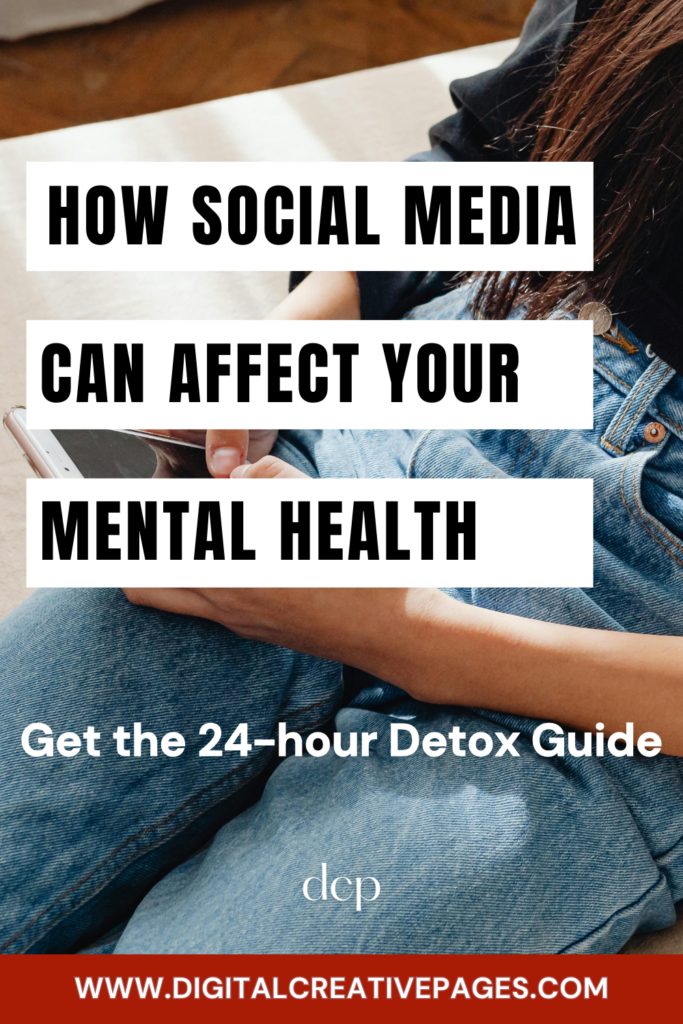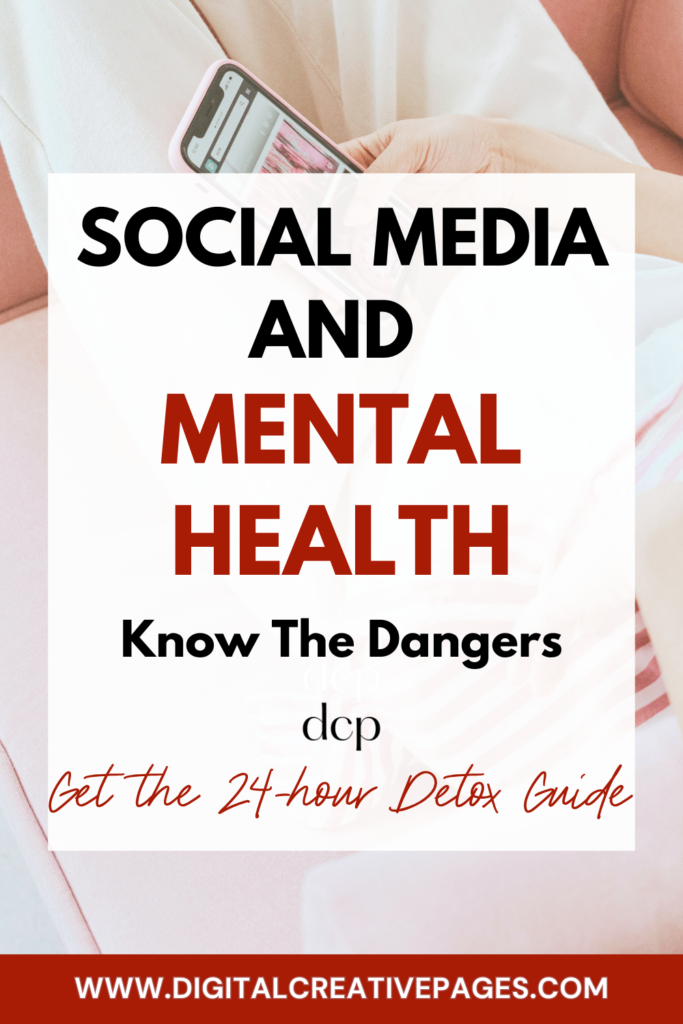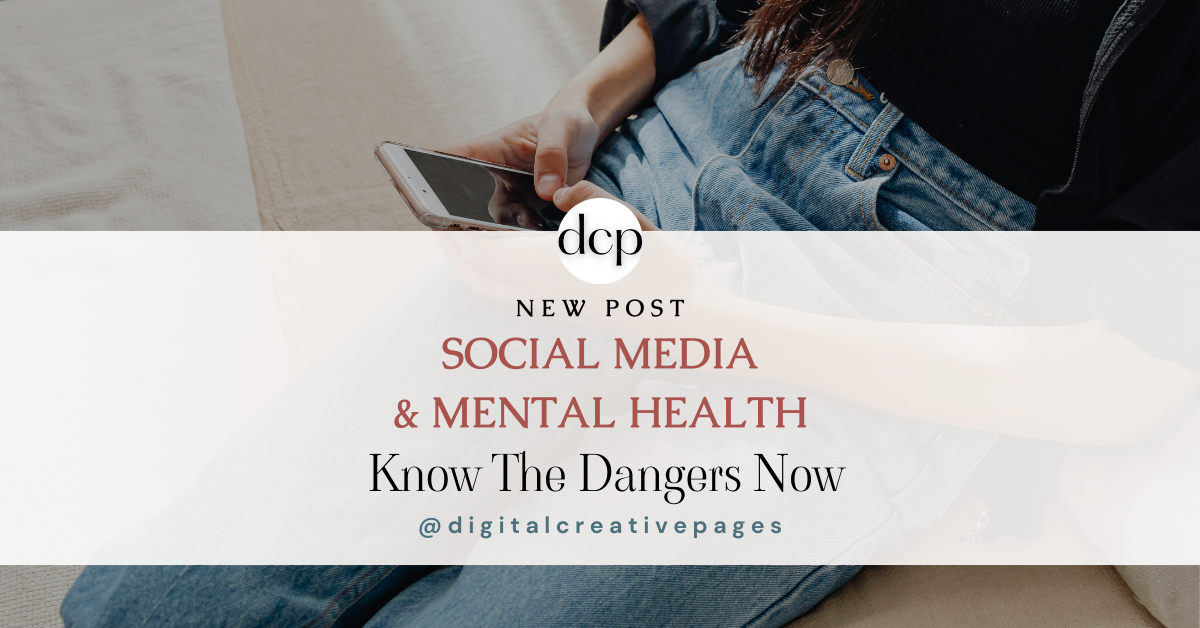Introduction
In today’s hyper-connected world, social media has become ingrained in our lives. Platforms like Instagram, Facebook, and TikTok offer a means to stay connected, share, and even grow businesses. But along with the convenience, social media has a darker side, particularly when it comes to mental health.
We often don’t realize how scrolling through curated highlights of others’ lives can negatively impact our mental well-being. This post will explore how social media influences mental health, from anxiety and depression to addiction, and provide you with actionable steps for a social media detox that can refresh your mind.

The Negative Effects of Social Media on Mental Health
1. Comparison and Self-Esteem Issues
One of the major ways social media affects mental health is through comparison. When you scroll through your feed on Instagram or Facebook, you see highlight reels of people’s best moments. It’s easy to compare your own life to those images, leading to feelings of inadequacy and low self-esteem.
This comparison on social media often leaves us feeling like we’re falling short. When it seems like everyone is more successful, more attractive, or happier, it can contribute to increased levels of depression. This constant comparison can rob us of self-worth and foster an unhealthy relationship with our self-image.
2. Social Media and Depression
Depression is one of the most significant impacts that social media can have on mental health. Constant exposure to other people’s curated lives can deepen feelings of loneliness and inadequacy, especially for those already prone to depression.
Several studies have found links between high social media usage and increased rates of depression. The pressure to appear “perfect” or get more likes and followers can amplify feelings of isolation. And, as mentioned earlier, the comparison trap can worsen depressive symptoms, making it hard for users to enjoy or even engage with real life.
3. Addiction and Anxiety
The addictive nature of social media is undeniable. Notifications, likes, and comments provide instant gratification, releasing dopamine in the brain. Over time, this leads to compulsive checking of apps, driving social media addiction. This addiction often leads to heightened levels of anxiety, especially if users feel the need to constantly stay connected and updated.
Anxiety worsens when users experience FOMO (Fear of Missing Out). Being bombarded with everyone else’s seemingly perfect life can make you feel like you’re always missing out, which triggers anxiety and stress.
4. Sleep Disruption
Late-night scrolling has become a widespread habit, but it comes at a cost. The blue light emitted by screens interferes with melatonin production, making it harder to fall asleep. Not only that, but the constant stimulation from checking updates or engaging with posts keeps your brain active when it should be winding down.
Lack of sleep is directly linked to worsening mental health, particularly increasing the risk of depression and anxiety. This is why creating boundaries around social media usage at night is critical to maintaining a healthy sleep routine.
5. Cyberbullying and Online Harassment
Unfortunately, social media has also opened the door for cyberbullying and harassment. The anonymity that social platforms provide can sometimes result in negative, hurtful comments or even targeted bullying. This can deeply affect mental health, leading to anxiety, depression, and feelings of isolation, especially in young adults.
The Positive Side of Social Media
While social media can be damaging, it’s important to note that it also has its benefits. It can connect people globally, foster support communities, and provide educational resources. However, the key to reaping the benefits of social media while maintaining good mental health is mindful usage.
Signs You Need a Social Media Detox
You might be wondering if it’s time to step back from social media. Here are some signs that you could benefit from a social media detox:
- You feel anxious or stressed when not checking your phone.
- You constantly compare yourself to others online.
- You’ve noticed your productivity dropping because of time spent on social media.
- Your sleep is suffering due to late-night scrolling.
- You feel overwhelmed by the constant flow of notifications.
The Benefits of a Social Media Detox
Taking a break from social media can offer several benefits:
- Reduced anxiety and stress: Less exposure to comparison and negativity can lead to improved mental well-being.
- Improved focus: Without distractions, your productivity can increase.
- Better sleep: Limiting nighttime social media use can restore your sleep schedule.
- More time for real-life interactions: A detox gives you space to reconnect with your surroundings.
How to Detox From Social Media Every Few Hours
You don’t have to completely unplug to feel the benefits of a social media detox. Here are some ways to detox every few hours to regain balance:
1. Set Timers
Set specific times during the day to check social media—limit this to 10 minutes every few hours. This helps keep your time on social media in check while preventing excessive usage.
2. Turn Off Notifications
Disabling push notifications can significantly reduce the temptation to check your phone constantly. Without the constant buzzes, you’ll find yourself less drawn to open apps.
3. Engage in Offline Activities
Find healthier alternatives to replace social media scrolling. Pick up a book, go for a walk, or pursue a hobby that doesn’t involve a screen.
4. Designate No-Screen Zones
Create areas in your home where social media is off-limits, such as the bedroom or dining room. This can help reinforce boundaries and improve mental health by reducing screen exposure.
5. Unfollow Negative Influences
Curate your social media feed by unfollowing accounts that make you feel negative or inadequate. Instead, follow positive, uplifting content.
Fast Social Media Detox: 5 Steps to Recharge Your Mind Every Few Hours”
Take control of your screen time with our Fast Social Media Detox guide. This simple, actionable resource is designed to help you step back from social media for short intervals throughout the day, reducing anxiety, stress, and mental fatigue. Our guide walks you through:
- Setting timers for social media use
- Creating no-screen zones
- Easy offline activities to replace scrolling
- Curating your feed to eliminate negativity
Download the guide and start detoxing from social media today for a healthier, happier you!
Conclusion
By understanding how social media impacts mental health, you can take steps to protect yourself from its negative effects. Whether it’s setting boundaries, doing a quick social media detox, or making more mindful decisions, prioritizing your mental well-being in a digital world is crucial.
MY TOP POSTS
- Mindfulness Practices For Women That Will Decrease Anxiety Now
- Boost Your Energy Naturally Now: Tips For Tired Women
- Imposter Syndrome – 7 Simple Steps To Overcome It Now
- 10 Home-Based Businesses That Will Make Women Rich Now
Stay connected outside my social media with my weekly Newsletter – Digital Content Pages
My introducer post – check out why I chose Showit as my website builder here
Use my code DCP to get one 1.5 months free on Showit
Get all the resources for your social media and digital marketing without breaking the bank from my DCP Shop here
Pin this for later

By signing up for my freebies, you are agreeing that I can use your email address to market to you. You can unsubscribe from marketing emails at any time by using the link in my emails.
Previous post
next post
Search + Enter
meet nila
Hi. I am
Nila
Beta reader, book editor, Pinterest manager, Showit VA
I’m a beta reader and book editor and PA for authors, specializing in story clarity and developmental feedback. I run a sustainable online business that keeps working for me 24/7.
Along with this, I offer Pinterest management for overwhelmed creatives and entrepreneurs and set up and customize Showit templates when the tech side gets too overwhelming.
My Shop
Buy now
i need it
Free Stuff
get the goods
check it out
My Favorites
apps + Tools
Yes, please
Handpicked Links
Excited to get started? Me too!
i can't wait to
Connect with you
Let's discuss how best I can help you and your business
find your way around
about
for authors
Showit
shop
Blog
freebies
Contact
elsewhere
X
Copyright © 2024 - 2026 Digital Creative Pages | All Rights Reserved | Terms & Conditions | Privacy Policy
Website Template by Digital Creative Pages.
Photos by Styled Stock Society
Subscribe here for weekly Canva & Social Media tips and 10% off in my shop
